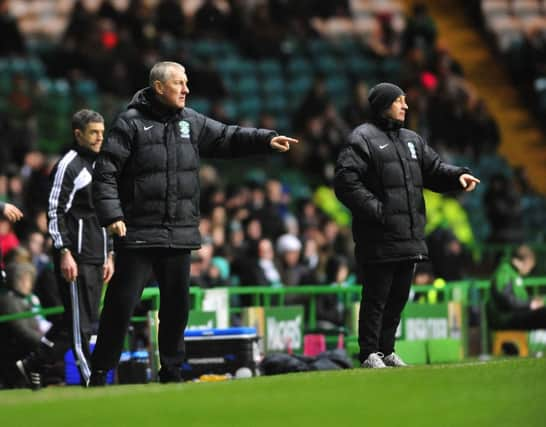Terry Butcher absence at Hibs won’t faze Malpas


But perhaps the best phrase for such an approach is conventional folly, for in reality the disciplinary action should have little or no effect on a club.
That is certainly the attitude of Hibernian assistant manager Maurice Malpas as he faces up to tomorrow’s home game against St Johnstone without Terry Butcher beside him. Butcher learned earlier this week that he would be banned from the dugout and dressing-room for this game, after his appeal against an SFA suspension from his time as Inverness manager succeeded only in overturning a £1,000 fine imposed on him.
Advertisement
Hide AdAdvertisement
Hide AdAlthough the pair have worked successfully together for years, Malpas is confident for several reasons that he can cope without the former England international beside him. For one thing, it is only a few weeks since he took charge of Caley Thistle, when Butcher sat in the stands at Easter Road just days before his appointment as successor to Pat Fenlon.
In any case, Malpas is customarily the more hands-on of the two, both in training at East Mains and during matches, with Butcher tending to intervene only occasionally. And should the manager want to communicate with the technical area, he will find it easy enough.
“It will make no difference at all,” Malpas said yesterday about the ban. “That last time I was in the other dugout, I was by myself as well. It’s a common occurrence. Terry sometimes sits in the stand anyway, and it’s not the first time he’s been banned.
“We just get on with it. We know what we want to happen on the pitch. We work together closely, so it’s not the case that I’ll be worrying that I have to change anything.
“I’m sure we’ll have communication between us. One time we tried phones and someone’s mum phoned. The last time we tried walkie-talkies and I couldn’t hear him because he was shouting.
“The best thing we did in the past was we had a young kid at Inverness who ran up and down the stairs and he said that was harder than a day’s pre-season. I tend to do all right when I’m on my own.”
Butcher will be unable to give one of his typically inspiring speeches right before the match tomorrow, because he is banned from the dressing-room from an hour before kick-off. But he has had time enough since being appointed to get his general message through to the players, and he and Malpas have been encouraged by the response.
So far the new management team’s only win has been in the Scottish Cup at Ross County, with three league fixtures having produced two draws with St Mirren and Partick Thistle and a narrow defeat by Celtic. But they are satisfied that they have already made Hibs more competitive throughout a game.
Advertisement
Hide AdAdvertisement
Hide Ad“We’re pleased with how things are going,” Malpas continued. “We have improved in every game. Last Saturday against Celtic, when everybody thought we were going to get smashed because that was what they did the two previous games, if we had had a bit of belief or our shooting boots had been on, we may have got a goal or two. We have to keep battling away, getting the ball in the box. Against Partick we had a few chances: we had loads of balls in the box but it didn’t fall to us. We’ll keep on encouraging the players to do that, and goals will come, that’s a certainty.”
Malpas is aware that Hibs’ higher tempo has led some to suggest that there is now a tendency to rush into attack and bypass the midfield. It is a suggestion he denies, preferring to see the style advocated by him and Butcher as simply a more positive one designed to create more scoring chances for a team who are still the lowest scorers in the league.
“We’re looking to get the ball forward quicker and a lot of people are saying we’re back to front. I’ve never played in, or been involved in, a back-to-front team. I have never asked a team to play back to front. We want to get the ball forward quicker and get in the last third and see what happens. That’s where you earn your corn, in the last third of the pitch.
“There’s nothing more frustrating for a striker if the ball doesn’t come into the box. We’re trying to drum that into them. It’s maybe different to what Pat did, but that’s our philosophy. We want to get the ball into the box. If you do that you score goals. If you score goals, you win games.”
And, whatever their other virtues, it is not managers who score those goals, no matter if they are in the dugout or the directors’ box, or sitting at the back of the main stand.